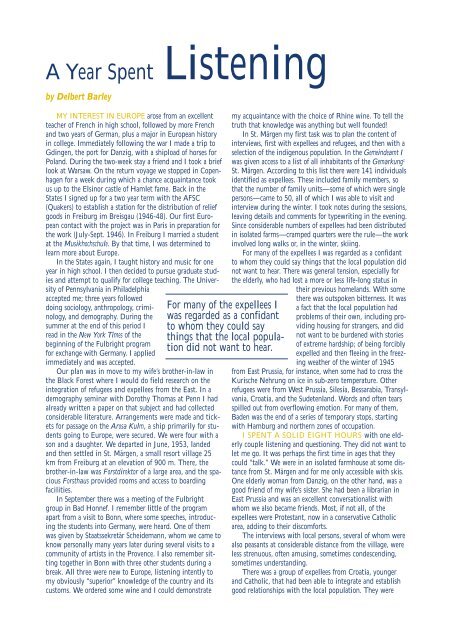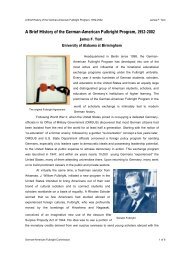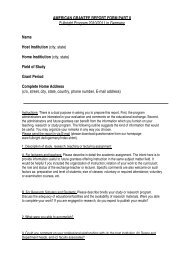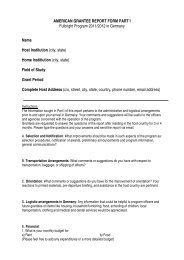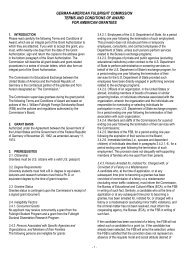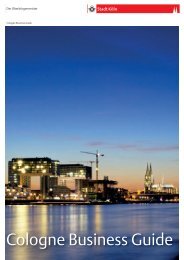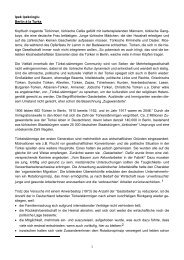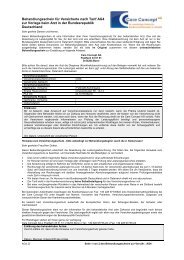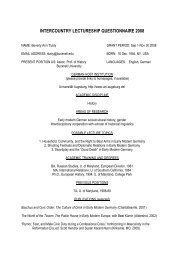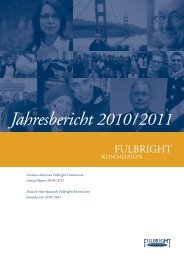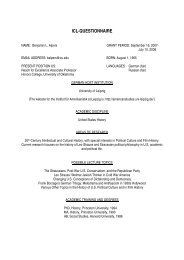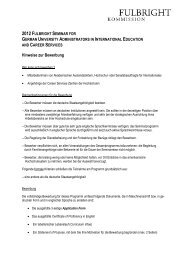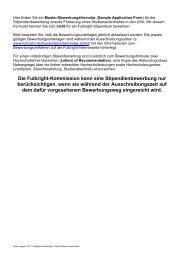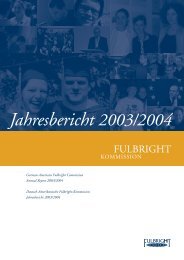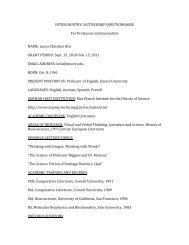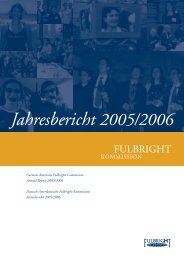The First Class of Fulbrighters - Fulbright-Kommission
The First Class of Fulbrighters - Fulbright-Kommission
The First Class of Fulbrighters - Fulbright-Kommission
You also want an ePaper? Increase the reach of your titles
YUMPU automatically turns print PDFs into web optimized ePapers that Google loves.
A Year Spent Listening<br />
by Delbert Barley<br />
MY INTEREST IN EUROPE arose from an excellent<br />
teacher <strong>of</strong> French in high school, followed by more French<br />
and two years <strong>of</strong> German, plus a major in European history<br />
in college. Immediately following the war I made a trip to<br />
Gdingen, the port for Danzig, with a shipload <strong>of</strong> horses for<br />
Poland. During the two-week stay a friend and I took a brief<br />
look at Warsaw. On the return voyage we stopped in Copenhagen<br />
for a week during which a chance acquaintance took<br />
us up to the Elsinor castle <strong>of</strong> Hamlet fame. Back in the<br />
States I signed up for a two year term with the AFSC<br />
(Quakers) to establish a station for the distribution <strong>of</strong> relief<br />
goods in Freiburg im Breisgau (1946-48). Our first European<br />
contact with the project was in Paris in preparation for<br />
the work (July-Sept. 1946). In Freiburg I married a student<br />
at the Musikhochschule. By that time, I was determined to<br />
learn more about Europe.<br />
In the States again, I taught history and music for one<br />
year in high school. I then decided to pursue graduate studies<br />
and attempt to qualify for college teaching. <strong>The</strong> University<br />
<strong>of</strong> Pennsylvania in Philadelphia<br />
accepted me; three years followed<br />
doing sociology, anthropology, criminology,<br />
and demography. During the<br />
summer at the end <strong>of</strong> this period I<br />
read in the New York Times <strong>of</strong> the<br />
beginning <strong>of</strong> the <strong>Fulbright</strong> program<br />
for exchange with Germany. I applied<br />
immediately and was accepted.<br />
Our plan was in move to my wife’s brother-in-law in<br />
the Black Forest where I would do field research on the<br />
integration <strong>of</strong> refugees and expellees from the East. In a<br />
demography seminar with Dorothy Thomas at Penn I had<br />
already written a paper on that subject and had collected<br />
considerable literature. Arrangements were made and tickets<br />
for passage on the Arosa Kulm, a ship primarily for students<br />
going to Europe, were secured. We were four with a<br />
son and a daughter. We departed in June, 1953, landed<br />
and then settled in St. Märgen, a small resort village 25<br />
km from Freiburg at an elevation <strong>of</strong> 900 m. <strong>The</strong>re, the<br />
brother-in-law was Forstdirektor <strong>of</strong> a large area, and the spacious<br />
Forsthaus provided rooms and access to boarding<br />
facilities.<br />
In September there was a meeting <strong>of</strong> the <strong>Fulbright</strong><br />
group in Bad Honnef. I remember little <strong>of</strong> the program<br />
apart from a visit to Bonn, where some speeches, introducing<br />
the students into Germany, were heard. One <strong>of</strong> them<br />
was given by Staatssekretär Scheidemann, whom we came to<br />
know personally many years later during several visits to a<br />
community <strong>of</strong> artists in the Provence. I also remember sitting<br />
together in Bonn with three other students during a<br />
break. All three were new to Europe, listening intently to<br />
my obviously “superior” knowledge <strong>of</strong> the country and its<br />
customs. We ordered some wine and I could demonstrate<br />
For many <strong>of</strong> the expellees I<br />
was regarded as a confidant<br />
to whom they could say<br />
things that the local population<br />
did not want to hear.<br />
my acquaintance with the choice <strong>of</strong> Rhine wine. To tell the<br />
truth that knowledge was anything but well founded!<br />
In St. Märgen my first task was to plan the content <strong>of</strong><br />
interviews, first with expellees and refugees, and then with a<br />
selection <strong>of</strong> the indigenous population. In the Gemeindeamt I<br />
was given access to a list <strong>of</strong> all inhabitants <strong>of</strong> the Gemarkung 1<br />
St. Märgen. According to this list there were 141 individuals<br />
identified as expellees. <strong>The</strong>se included family members, so<br />
that the number <strong>of</strong> family units—some <strong>of</strong> which were single<br />
persons—came to 50, all <strong>of</strong> which I was able to visit and<br />
interview during the winter. I took notes during the sessions,<br />
leaving details and comments for typewriting in the evening.<br />
Since considerable numbers <strong>of</strong> expellees had been distributed<br />
in isolated farms—cramped quarters were the rule—the work<br />
involved long walks or, in the winter, skiing.<br />
For many <strong>of</strong> the expellees I was regarded as a confidant<br />
to whom they could say things that the local population did<br />
not want to hear. <strong>The</strong>re was general tension, especially for<br />
the elderly, who had lost a more or less life-long status in<br />
their previous homelands. With some<br />
there was outspoken bitterness. It was<br />
a fact that the local population had<br />
problems <strong>of</strong> their own, including providing<br />
housing for strangers, and did<br />
not want to be burdened with stories<br />
<strong>of</strong> extreme hardship; <strong>of</strong> being forcibly<br />
expelled and then fleeing in the freezing<br />
weather <strong>of</strong> the winter <strong>of</strong> 1945<br />
from East Prussia, for instance, when some had to cross the<br />
Kurische Nehrung on ice in sub-zero temperature. Other<br />
refugees were from West Prussia, Silesia, Bessarabia, Transylvania,<br />
Croatia, and the Sudetenland. Words and <strong>of</strong>ten tears<br />
spilled out from overflowing emotion. For many <strong>of</strong> them,<br />
Baden was the end <strong>of</strong> a series <strong>of</strong> temporary stops, starting<br />
with Hamburg and northern zones <strong>of</strong> occupation.<br />
I SPENT A SOLID EIGHT HOURS with one elderly<br />
couple listening and questioning. <strong>The</strong>y did not want to<br />
let me go. It was perhaps the first time in ages that they<br />
could “talk.” We were in an isolated farmhouse at some distance<br />
from St. Märgen and for me only accessible with skis.<br />
One elderly woman from Danzig, on the other hand, was a<br />
good friend <strong>of</strong> my wife’s sister. She had been a librarian in<br />
East Prussia and was an excellent conversationalist with<br />
whom we also became friends. Most, if not all, <strong>of</strong> the<br />
expellees were Protestant, now in a conservative Catholic<br />
area, adding to their discomforts.<br />
<strong>The</strong> interviews with local persons, several <strong>of</strong> whom were<br />
also peasants at considerable distance from the village, were<br />
less strenuous, <strong>of</strong>ten amusing, sometimes condescending,<br />
sometimes understanding.<br />
<strong>The</strong>re was a group <strong>of</strong> expellees from Croatia, younger<br />
and Catholic, that had been able to integrate and establish<br />
good relationships with the local population. <strong>The</strong>y were


